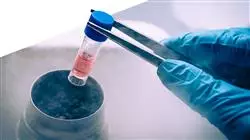University certificate
The world's largest faculty of pharmacy”
Introduction to the Program
With this 100% online program, you will delve into the monitoring, promotion and protection of TECH, disease prevention, international health, information systems, communication and research"

In today's Public Health landscape, pharmacists occupy a pivotal role as a bridge between the community and healthcare services. From the promotion of vaccination to the management of medicines, these professionals play a crucial role in the protection and promotion of Public Health
In this context, this program was conceived with the purpose of providing pharmacists with specialized, comprehensive and multidisciplinary training. Therefore, through a broad and integrative perspective, the fundamentals of Public Health in the 21st century will be addressed, such as surveillance, health promotion and protection, disease prevention, foreign health management and international health.
Likewise, this academic degree will guarantee a first class preparation in scientific and epidemiological methodology, focused on analyzing the distribution and determinants of health problems in the population, as well as on developing strategies for prevention and health control. In addition, the program will focus on the field of community health, emphasizing the reduction of inequalities through the creation of intervention and prevention programs at the community level.
Finally, the curriculum will cover global health challenges such as communicable diseases, malnutrition and barriers to accessing health services, with special attention to vulnerable groups such as children, the elderly and people with disabilities. It will also provide an update on crisis management and health emergencies, including the response to epidemics, natural disasters and acts of terrorism.
In view of this, an online academic program of excellence has been developed to adapt to the individual needs of students and avoid the difficulties associated with traveling to a physical campus and adjusting to a predetermined schedule. Additionally, the innovative Relearning methodology has been integrated, which implies the repetition of the fundamental concepts for an effective and natural assimilation of the contents.
You will address community health, with an emphasis on reducing inequalities through the implementation of prevention and intervention programs. What are you waiting for to enroll?"
This Professional master’s degree in Public Health contains the most complete and up-to-date scientific program on the market. The most important features include:
- Development of practical case studies presented by experts in health sciences
- The graphic, schematic and practical contents with which it is conceived provide scientific and practical information on those disciplines that are essential for professional practice
- Practical exercises where the self-assessment process can be carried out to improve learning
- Its special emphasis on innovative methodologies
- Theoretical lessons, questions to the expert, debate forums on controversial topics, and individual reflection assignments
- Content that is accessible from any fixed or portable device with an Internet connection
You will analyze the distribution and determinants of population health problems, as well as the design of prevention and health control programs, through an extensive library of multimedia resources"
The program’s teaching staff includes professionals from the sector who contribute their work experience to this program, as well as renowned specialists from leading societies and prestigious universities.
The multimedia content, developed with the latest educational technology, will provide the professional with situated and contextual learning, i.e., a simulated environment that will provide immersive education programmed to prepare for real situations.
This program is designed around Problem-Based Learning, whereby the professional must try to solve the different professional practice situations that arise during the course. For this purpose, the students will be assisted by an innovative interactive video system created by renowned and experienced experts.
You will delve into global Public Health challenges, such as communicable diseases, malnutrition and limited access to health services, with a focus on vulnerable groups. With TECHquality guarantee!"

Take advantage of this opportunity that only TECHoffers you! You will acquire up-to-date training in crisis management and health emergencies, including response to epidemics, natural disasters and terrorist acts"
Why study at TECH?
TECH is the world’s largest online university. With an impressive catalog of more than 14,000 university programs available in 11 languages, it is positioned as a leader in employability, with a 99% job placement rate. In addition, it relies on an enormous faculty of more than 6,000 professors of the highest international renown.

Study at the world's largest online university and guarantee your professional success. The future starts at TECH”
The world’s best online university according to FORBES
The prestigious Forbes magazine, specialized in business and finance, has highlighted TECH as “the world's best online university” This is what they have recently stated in an article in their digital edition in which they echo the success story of this institution, “thanks to the academic offer it provides, the selection of its teaching staff, and an innovative learning method aimed at educating the professionals of the future”
A revolutionary study method, a cutting-edge faculty and a practical focus: the key to TECH's success.
The most complete study plans on the university scene
TECH offers the most complete study plans on the university scene, with syllabuses that cover fundamental concepts and, at the same time, the main scientific advances in their specific scientific areas. In addition, these programs are continuously being updated to guarantee students the academic vanguard and the most in-demand professional skills. In this way, the university's qualifications provide its graduates with a significant advantage to propel their careers to success.
TECH offers the most comprehensive and intensive study plans on the current university scene.
A world-class teaching staff
TECH's teaching staff is made up of more than 6,000 professors with the highest international recognition. Professors, researchers and top executives of multinational companies, including Isaiah Covington, performance coach of the Boston Celtics; Magda Romanska, principal investigator at Harvard MetaLAB; Ignacio Wistumba, chairman of the department of translational molecular pathology at MD Anderson Cancer Center; and D.W. Pine, creative director of TIME magazine, among others.
Internationally renowned experts, specialized in different branches of Health, Technology, Communication and Business, form part of the TECH faculty.
A unique learning method
TECH is the first university to use Relearning in all its programs. It is the best online learning methodology, accredited with international teaching quality certifications, provided by prestigious educational agencies. In addition, this disruptive educational model is complemented with the “Case Method”, thereby setting up a unique online teaching strategy. Innovative teaching resources are also implemented, including detailed videos, infographics and interactive summaries.
TECH combines Relearning and the Case Method in all its university programs to guarantee excellent theoretical and practical learning, studying whenever and wherever you want.
The world's largest online university
TECH is the world’s largest online university. We are the largest educational institution, with the best and widest online educational catalog, one hundred percent online and covering the vast majority of areas of knowledge. We offer a large selection of our own degrees and accredited online undergraduate and postgraduate degrees. In total, more than 14,000 university degrees, in eleven different languages, make us the largest educational largest in the world.
TECH has the world's most extensive catalog of academic and official programs, available in more than 11 languages.
Google Premier Partner
The American technology giant has awarded TECH the Google Google Premier Partner badge. This award, which is only available to 3% of the world's companies, highlights the efficient, flexible and tailored experience that this university provides to students. The recognition as a Google Premier Partner not only accredits the maximum rigor, performance and investment in TECH's digital infrastructures, but also places this university as one of the world's leading technology companies.
Google has positioned TECH in the top 3% of the world's most important technology companies by awarding it its Google Premier Partner badge.
The official online university of the NBA
TECH is the official online university of the NBA. Thanks to our agreement with the biggest league in basketball, we offer our students exclusive university programs, as well as a wide variety of educational resources focused on the business of the league and other areas of the sports industry. Each program is made up of a uniquely designed syllabus and features exceptional guest hosts: professionals with a distinguished sports background who will offer their expertise on the most relevant topics.
TECH has been selected by the NBA, the world's top basketball league, as its official online university.
The top-rated university by its students
Students have positioned TECH as the world's top-rated university on the main review websites, with a highest rating of 4.9 out of 5, obtained from more than 1,000 reviews. These results consolidate TECH as the benchmark university institution at an international level, reflecting the excellence and positive impact of its educational model.” reflecting the excellence and positive impact of its educational model.”
TECH is the world’s top-rated university by its students.
Leaders in employability
TECH has managed to become the leading university in employability. 99% of its students obtain jobs in the academic field they have studied, within one year of completing any of the university's programs. A similar number achieve immediate career enhancement. All this thanks to a study methodology that bases its effectiveness on the acquisition of practical skills, which are absolutely necessary for professional development.
99% of TECH graduates find a job within a year of completing their studies.
Professional Master's Degree in Public Health
Discover at TECH Global University an exceptional opportunity to specialize in the exciting field of Public Health through our Professional Master's Degree, taught by the School of Pharmacy. This program, designed for health professionals interested in expanding their knowledge and skills in the community area, offers online classes that allow you to access the course content from anywhere and at any time, adapting to your schedule and pace of life. Nowadays, Public Health plays a fundamental role in disease prevention, promotion of healthy lifestyles and management of health policies at the community level. With our Professional Master's Degree in Public Health, you will learn about the fundamental principles of public health, epidemiology, health management and health promotion, among other relevant topics.
Earn a degree in Public Health
TECH's teaching team is composed of experts in the field of public health, preventive medicine and health management, who will guide you throughout your learning process, providing you with the theoretical and practical tools necessary to excel in this constantly evolving field. Our practical approach will allow you to apply the knowledge acquired in real situations, through case studies, practical projects and internships that will prepare you to face the challenges of the public health field.







